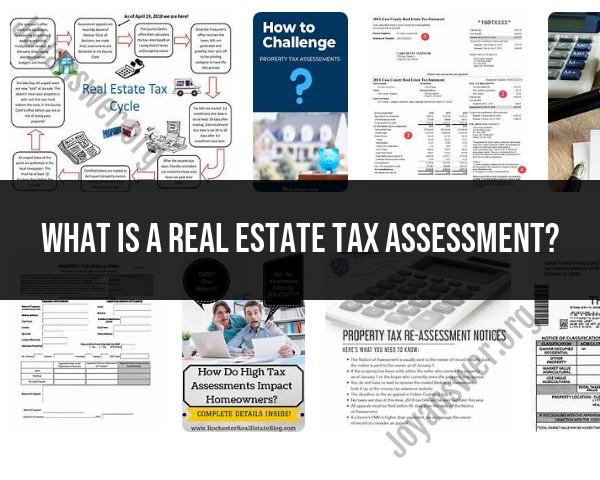What is a real estate tax assessment?
A real estate tax assessment is an evaluation of the value of a property conducted by a government agency or authority for the purpose of determining the property tax owed by the owner. This assessment is a crucial component of the property tax system, which is a primary source of revenue for local governments. The real estate tax assessment is used to calculate the amount of property tax a property owner is required to pay.
Here are key aspects of real estate tax assessments:
1. Assessment Authority:
- Real estate tax assessments are typically conducted by a local government agency or assessment authority. The specific agency responsible for property tax assessments can vary by jurisdiction.
2. Valuation Methods:
- Various methods may be employed to determine the assessed value of a property. Common valuation methods include:
- Market Value: The estimated price the property would fetch in the open market under normal conditions.
- Comparable Sales: Comparing the property in question to similar properties that have recently been sold.
- Cost Approach: Estimating the cost to replace the property with a similar one, minus depreciation.
3. Frequency of Assessment:
- The frequency of real estate tax assessments can vary. Some jurisdictions conduct assessments annually, while others may do so less frequently. Regular assessments help ensure that property values are kept up-to-date.
4. Appeals Process:
- Property owners typically have the right to appeal their real estate tax assessments if they believe the assessed value is inaccurate. The appeals process allows property owners to present evidence supporting their claim of an inaccurate assessment.
5. Tax Rates and Revenue Collection:
- Once the property is assessed, local governments apply a tax rate to the assessed value to determine the property tax owed by the owner. The collected property taxes contribute to local government revenue.
6. Use of Property Tax Revenues:
- Property tax revenues are used by local governments to fund various public services and projects, including schools, roads, public safety, parks, and other community needs.
7. Exemptions and Deductions:
- Some jurisdictions may offer exemptions or deductions that reduce the taxable value of certain properties. Common exemptions include those for homesteads, agricultural land, or properties owned by certain nonprofit organizations.
8. Assessment Notices:
- Property owners typically receive assessment notices that provide details about the assessed value of their property, the applicable tax rate, and the resulting property tax amount. This information is crucial for property owners to understand their tax obligations.
Importance of Real Estate Tax Assessment:
- Equitable Taxation: Real estate tax assessments aim to ensure that property owners contribute to local government funding in a manner that reflects the value of their real estate holdings.
- Revenue Generation: Property taxes are a significant source of revenue for local governments, supporting essential services and community development.
- Fairness and Transparency: An effective assessment process promotes fairness and transparency in property taxation, ensuring that similar properties are taxed at similar rates.
Understanding the real estate tax assessment process is important for property owners, as it directly impacts their property tax obligations. Property tax laws and assessment practices can vary, so property owners should be aware of the regulations in their specific jurisdiction. Additionally, property owners may have the opportunity to appeal their assessments if they believe there are errors or discrepancies.
Sure, here are the answers to your questions:
What role does a real estate tax assessment play in property valuation?
A real estate tax assessment is a formal evaluation of the fair market value of a property for the purpose of determining its taxable value. It is a crucial step in the property tax process, providing the basis for calculating the amount of property taxes owed by the property owner.
A real estate tax assessment is typically conducted by a government assessor or appraiser, who considers various factors to determine the property's value, including:
Property characteristics: The size, location, condition, and features of the property significantly influence its value.
Comparable sales: Assessors analyze recent sales of similar properties in the area to establish a benchmark for the property's value.
Cost approach: This method estimates the value of the property by calculating the cost of replacing the improvements on the land with new ones.
Income approach: This method projects the potential rental income the property could generate and discounts that income stream to arrive at a present value.
The real estate tax assessment provides an official estimate of the property's value, but it may not always reflect the actual market value, especially if the market has fluctuated since the assessment was conducted. Property owners have the right to appeal their assessment if they believe it is inaccurate.
How often are real estate tax assessments conducted?
The frequency of real estate tax assessments varies depending on local jurisdiction. In some areas, assessments are conducted annually, while in others, they may be conducted every few years or even less frequently. The goal is to ensure that property values are updated periodically to reflect changes in the market.
How does a real estate tax assessment impact property taxes?
The real estate tax assessment directly impacts the amount of property taxes a homeowner or property owner owes. The taxable value of the property, determined by the assessment, is multiplied by the applicable property tax rate to calculate the annual property tax bill.
A higher assessed value typically leads to a higher property tax bill, while a lower assessed value can reduce the property tax burden. Property taxes are a significant source of revenue for local governments, used to fund essential services such as education, infrastructure, and public safety.
It's important to note that property taxes are just one of the many factors that influence the overall cost of ownership of a property. Other factors, such as mortgage payments, insurance, and maintenance costs, also play a role in the total cost of owning a home.













